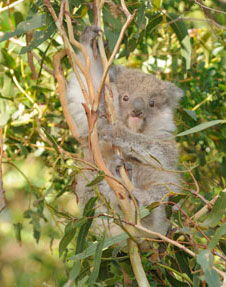 Australia's most at-risk populations of koalas (Phascolarctos cinereus) – those in Queensland,New South Wales and the Australian Capital Territory - are now protected under national environment law. These FAQs have been developed to inform industry, developers, landholders and landowners.
Australia's most at-risk populations of koalas (Phascolarctos cinereus) – those in Queensland,New South Wales and the Australian Capital Territory - are now protected under national environment law. These FAQs have been developed to inform industry, developers, landholders and landowners.
CLICK ON IMAGE to read about the listing and associated reports from federal government. After considering scientific advice from the Threatened Species Scientific Committee, Environment Minister Tony Burke has listed the Queensland, New South Wales and Australian Capital Territory koala populations as vulnerable under national environment law.
The world is watching us in Australia to see whether we as a people, a nation, can save our iconic koala from extinction in all its local habitats. Unfortunately while we have many carers and wildlife support systems to rescue injured and sick koalas and save many to be rehabilitated there are as many individuals businesses and corporations that do not respect the values of habitat for wildlife - insisting that the financial costs of accommodating koala habitat is not an option.
The Australia government's declaration of partial protection under the EPBC Act is a small and hard won victory for the local and global conservation movement. 95% of South East Queensland's natural koala habitat is now gone as a result of land clearing that's making way for new urban dwellings to keep up with what is Australia's fastest growing region. Operation bulldozer has been in place and our new state government under leadership of Campbell Newman is not happy with federal legislation slowing down development in Queensland.
Referral to the federal environment minister however will only be required if a development or action is likely to result in a significant impact to koala populations or their habitat. This is guided by relevant EPBC Act Significant Impact Guidelines, including specific Koala Significant Impact Guidelines which are currently being prepared.
Every species requires food to survive and for the koala their diet is restricted to a narrow range of eucalyptus trees. Not all gums are a food source and even koalas have their favoured trees - developed from the supply in their home range. The legislated requirement to return koalas their home range is a challenging one as ever more habitat has been cleared for human housing and asociated services or infrastructure.
May edition of National Geographic magazine feaures the hazards of being a koala in South East Queensland and the dedication that some of our koala heroes provide to rescue as many koalas as possible. Extracting a koala from barbed wire fencing in dark early hours of morning, scaling tall trees to monitor koala movement and sharing one's house with recouperating koalas are some tasks gladly tackled - and freely - to help our endangered koala population. Deidre de Villiers is one of these people.
Learning to live in harmony with our local koalas - be they urban or rural is critical for their survival. LACA is firmly committed to the belief that this is not only possible but essential. Deidre was one of our speakers where we presented ways to work towards achieving this.
It is unfortunate that that sector of our community who see faster development as part of their business model feel threatened by new federal legislation. Our fast society - fast food, fast money, fast cars, fast development - does not connect with life in a slower lane where nature can be appreciated. We who connect with and care about the natural world and its species have an important role to play to rescue the koala from extinction. The determination of Debbie Tabbard of the Australian Koala Foundation, the community support for Australia Zoo and Currumbin Wildlife Sanctuary in Queensland, the many nameless volunteers carers, landcare groups, organic farmers, scientists and researchers has been rewarded with federal legislation as a first real step to slowing the road to extinction.
As caring citizens we need to be watchdogs for compliance. We have also to network in our local communities and with local and state government agencies to create a better understanding of the value of biodiversity and functional healthy ecosystems.
Mr Burke's announcement includes some small but inadequate funding. The video clip linked here alerts us to the unsatisfactory "solution" of offsetting to allow a development to proceed. To date LACA's experience of offsetting has not occurred in local area concerned, has not benefited endangered target group and has not improved any corridors to allow koalas to move independantly. In addition if such offset are nor established pre-clearing they will not be a viable food source for the endangered local koalas.